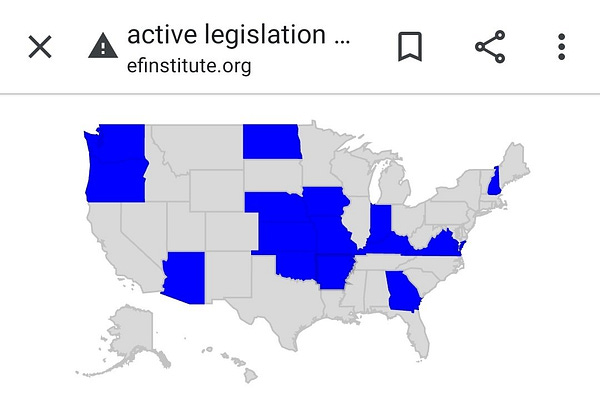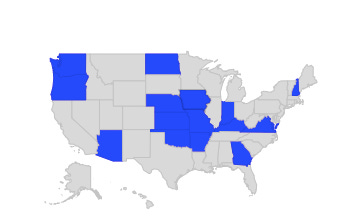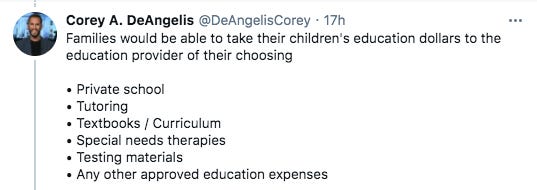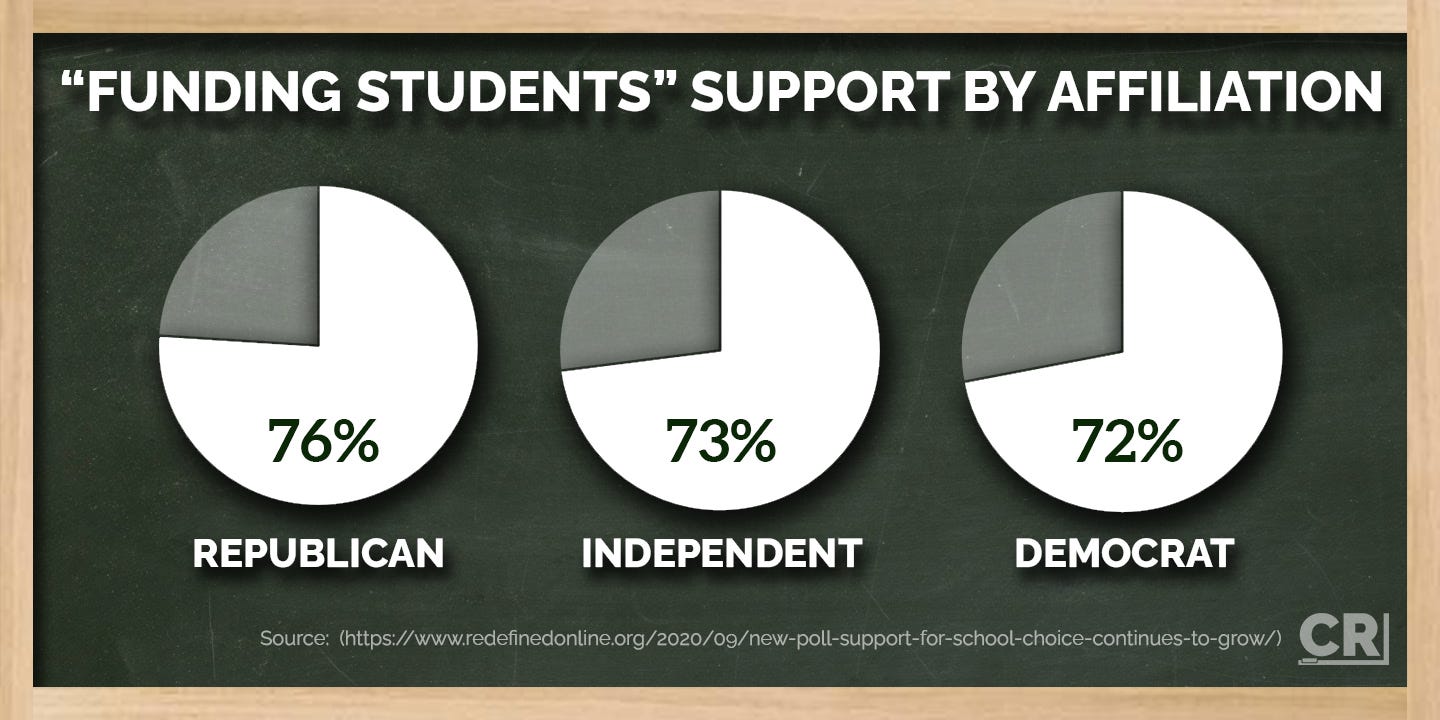15 States Take Action to Help Students and Parents
While my state deliberately puts up roadblocks that trap low-income parents and students in schools they are trying to leave
Chalk Talk
Update: Since I published this piece two more states have been added to this map—Idaho and Florida. The total is now 17! I am preserving the original text but if you follow the links below they will take you to an updated list and map.
In the wake of the absolute havoc that COVID-19 has wreaked on K12 education, students and families, legislators in at least 15 states have introduced bills to fund students instead of systems. The bills vary in their specifics but all were written with the goal of getting education dollars directly into the hands of families so they can access what their children what they need.
All the states in blue on the map below are somewhere in the process of trying to pass one of these education related bills. Corey DeAngelis of the Reason Foundation and EFI (Educational Freedom Institute) has been tracking all of this legislative activity, reminding the naysayers that if we allow people on food stamps to choose their grocery stores, there’s no logical reason we wouldn’t also allow parents to use their tax dollars to choose their schools.


To give a sense of what a parent will be able to do with these dollars in states where state legislatures are taking action, here’s a quick breakdown of what the Arkansas bill would do:
Arizona also has a bill in the works—it has just passed the senate and is headed to the house. Here’s how the votes broke down on the senate side:
This partisan visual above helps to explain what is happening in my state of Rhode Island where we are as blue as blue can be and where efforts are underway to further limit educational options for students. Charter schools are basically the only form of educational freedom that low income parents have in our state and our senate education committee just greased the skids to shut them down. The chance of our state legislature following in the footsteps of New Hampshire and the 14 other states is zero.
Here’s a quick look at how the Rhode Island legislature breaks down by party:
Their refusal is not based on principle. Democrats in my state are quick to support public dollars for private (and religious) Pre-K and for Pell Grants to private (and religious) universities. They have no problem allowing people with a housing voucher to choose where to live and they support those on food assistance having the freedom to shop at Stop & Shop, Market Basket, or Price Rite or wherever else they may choose.
But, due to obvious cognitive dissonance and union money and influence, they oppose low-income constituents having any agency or autonomy when it comes to the education of their children between kindergarten and 12th grade. They do not believe that parents deserve the self-determination that comes with having options (unless they have money to pick schools via the real estate market or send their children to private school on their on dime.) The vast majority of Rhode Island residents cannot afford to do either of those things and the same is true across the country.
Charter schools—the only schooling alternative available to low income families in Rhode Island—are now under attack.
The senate education committee just voted 8-1 for a charter moratorium that would extend through the 2024 school year. Remember that Johns Hopkins report on the Providence schools that sent shockwaves through the national media showing it to be, arguably, the worst and most dysfunctional school system in the country? The charter schools they hope to block from opening and/or expanding would largely serve Providence students. The senator on the committee who represents Providence predictably opted out of the public system for her own children and put them in one of the most expensive private schools in the state. But, like so many “choice for me, not for thee” types, she does not believe that the low income parents in the city she represents deserve to have options.
In a hearing that lasted four hours, parents were forced to wait to testify while union officials and elected leaders got to go first during public comment. The state president of the National Education Association (NEA) was first to speak, followed by the Providence mayor. Are we to believe that they lead busier lives than the parents willing to wait hours to plead for the opportunity to send their sons and daughters to a different school than the one they are chained to because of their zip code? Is their commentary so important that they should be allowed to cut the line?
This ugly practice of line cutting at public hearings is nothing new around here but it deserves to be called out at every turn.
With very few exceptions, we heard the senators talk about money, money, money—they made it clear that they believe that school districts, regardless of performance, are entitled to other people’s children because of the dollars that attach to those children. It is the only thing they talk about when they aren’t revealing their utter ignorance on the topic at hand. It is also what the teachers’ unions pour money into their pockets to say.
All eight Democrats on the committee who voted to approve the charter moratorium at a time of educational crisis for families are a pitiful and far less entertaining version of Cuba Gooding Jr. as Rod Tidwell telling Jerry Maguire to “show me the money.”
Kudos to the one senator who voted no.
It remains confounding that the party that has long prided itself on its commitment to “the little guy” and promised that it represents black and brown voters is so hostile to the very choices that their voters overwhelmingly support.
Parents across the nation have long wanted schooling alternatives for their children but the pandemic has served as an accelerant for that view. But consistently—even during a time of educational crisis—parents bump into a big blue wall of obstruction and deflection, always about money, never about student outcomes or the obvious truth that no school can be the right fit for every child.
Don’t believe their calls for “equity”—they don’t mean it. Educational fairness cannot exist when parents without financial means are denied educational freedom.
The MotherLand
Quotes of the week from my 2021 set of My Three Sons:
“I kind of want the thrill of JJ driving us to practice but I also don’t want to die.” (This from youngest son feeling ambivalent about oldest son getting his learner’s permit. Happy to report they made it to practice intact.)
“Mom, I’m not going to wear my retainer tonight. My legs are too tired for it.”
And during remote learning and in response to me talking (or singing maybe?) when he *wasn’t* on mute:
Him: “Mommmmmmmmm!”
Me: “Geez, I didn’t realize I can’t talk in my own house.”
Him: “Well, you can’t.”
G & G
Nothing new for these two except living the dream with everybody still home almost all the time after 10 months. Big guy on the right got a bit of a scolding when he stole a plate of steak tips just out of the Air Fryer but I quickly forgave him for obvious reasons having to do with his adorable-ness and undying loyalty to me, the pack leader. That’s Gracie on the left, Griffey on the right.
Wishing you all peace and love.
Talk soon,
Erika









